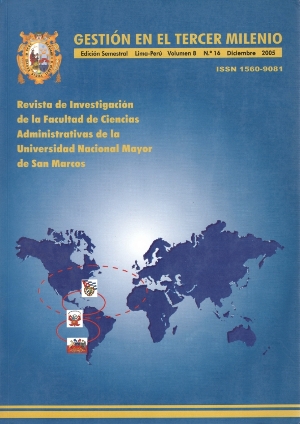EL POTENCIAL HUMANO Y LOS ESTÍMULOS ORGANIZACIONALES
DOI:
https://doi.org/10.15381/gtm.v8i16.9367Keywords:
Motivation, Collaborator, Administration of the Human PotentialAbstract
The results of the present investigation reveal the strategies that should be used to motivate the worker average in assistance institutions of the Sector Health. These they are related with the satisfaction of training necessities, promotion and ascents, and institutional recognition to the developed work. This order revealed by the surveys applied the workers of the Perinatal Maternal Specialized Institute (IEMP), the bound stimuli to economic and pecuniary aspects occupy the third group of preferences after the improvement of labor conditions, via permanent equipment and appropriate materials for their work. Such results are inverse to that proposed by Abraham Maslow, in their famous theory of the hierarchy of necessities. The results also reveal that the workers of the Sector Health - via investigation in the IEMP - they demand a democratic institutional address that allows them to make decisions in inherent activities to their function and to contribute constructively in the institutional development. It implies a change of paradigms, of the directive and intermediate bosses who should learn how to trust and to delegate the functions in their collaborators.Downloads
Published
Issue
Section
License
Copyright (c) 2005 Pedro Leonardo Tito Huamaní, Juan Castillo Maza

This work is licensed under a Creative Commons Attribution-NonCommercial-ShareAlike 4.0 International License.
THE AUTHORS RETAIN THEIR RIGHTS:
(a) The authors retain their trademark and patent rights, and also over any process or procedure described in the article.
(b) The authors retain the right to share, copy, distribute, execute and publicly communicate the article published in Gestión en el Tercer Milenio journal (for example, place it in an institutional repository or publish it in a book), with acknowledgment of its initial publication in the Gestión en el Tercer Milenio.
(c) Authors retain the right to make a subsequent publication of their work, to use the article or any part of it (for example: a compilation of their work, lecture notes, thesis, or for a book), provided that they indicate the source. of publication (authors of the work, magazine, volume, number and date).













